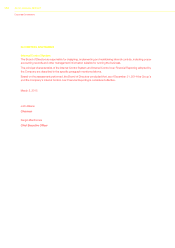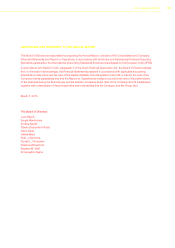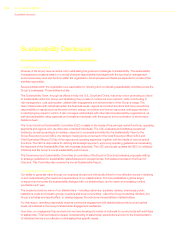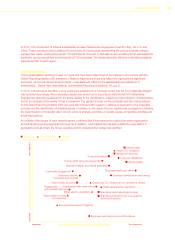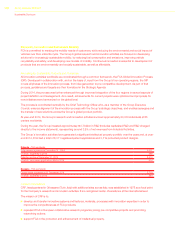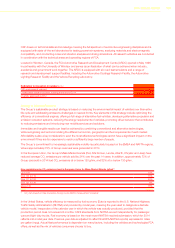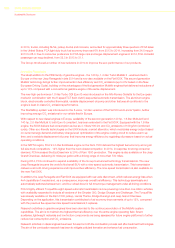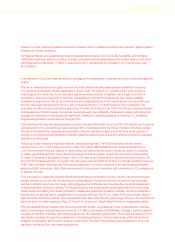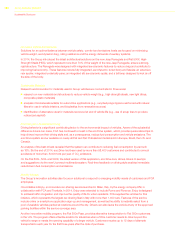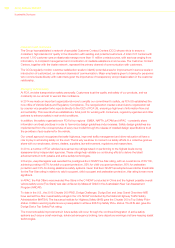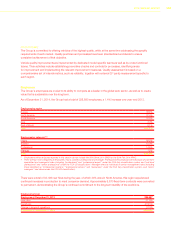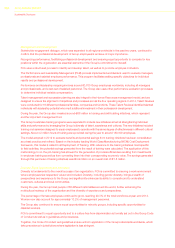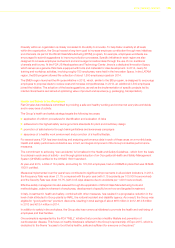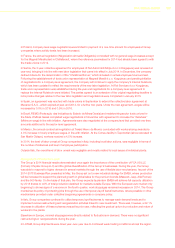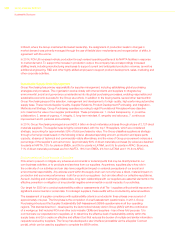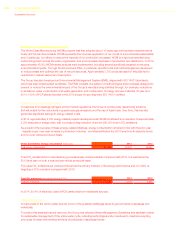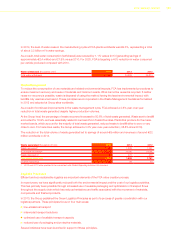Chrysler 2014 Annual Report Download - page 123
Download and view the complete annual report
Please find page 123 of the 2014 Chrysler annual report below. You can navigate through the pages in the report by either clicking on the pages listed below, or by using the keyword search tool below to find specific information within the annual report.
2014 | ANNUAL REPORT 121
Mobility options are also available to support employee commuting. One project is easygo, started at Mirafiori, Turin
(Italy). Easygo targeted approximately 18,000 employees who commute to and from the complex, and has been
implemented in other plants as well. Through a dedicated portal, employees can arrange car-pooling with coworkers
and access updated information on public transport and mobility services.
In the U.S., a grassroots sustainability program promotes vanpool options for employee commuting. In 2014, over 170
vanpool participants avoided driving individual vehicles an additional 3 million km.
The program advantages include reducing the environmental impact of daily commuting, as well as employee benefits
such as reducing commute times, cost, stress and the risk of accidents.
In addition FCA’s Autonomy program provides tailored vehicle solutions for customers with reduced motor abilities. In
Italy, revenues from the sale of Autonomy vehicles totaled €117 million in 2014.
Youth have an important part to play in any discussion about the future of mobility. In collaboration with the Italian
Departments of Education and the Environment, FCA launched the Fiat Likes U project in 2012 (with students from
eight universities across Italy taking part. The project represents the first time in Europe that an automaker has worked
with universities on an initiative to promote environmental awareness and the use of eco-friendly cars through the
three-pronged approach of Mobility (free car-sharing service for students), Study (eight €5,000 university scholarships
and eight seminars conducted by FCA managers) and Work (eight paid internships within the Group).
The initiative has proved extremely successful: more than 1,200 students used the car service in 2014, which includes
a fleet of Fiat Pandas and 500Ls totaling more than 250,000 km. The cities involved in 2014 were Turin, Pisa, Padua,
Bologna and Rotterdam.
In addition to the expansion of the program in Italy to 10 national universities, the second phase of the Fiat Likes U
project extends to five additional countries: Netherlands, Spain, Poland, Denmark and Germany, reaching 785,000
students.
FCA is also a Global Partner of Expo 2015 in Milan, a non-commercial Universal Exposition oriented towards
interpreting the collective challenges faced by humanity.
Beginning in 2013, FCA provided a fleet of sustainable cars for use up to and during the Expo. A total of 35 vehicles
are already in use, including 21 natural gas-powered Fiat 500Ls. Closer to the opening of the Expo, an additional 50
natural gas/biomethane Fiat 500Ls will be made available for car sharing by visiting delegations from around the world,
together with 10 Fiat 500e electric service vehicles.
In the United States, the Group has been heavily engaged in research on future social and technological trends that
will affect nearly every aspect of our business - from design to manufacturing, marketing and human resources. In
2014, three research initiatives focused on mobility trends including Global Urban Mobility, U.S. Family Mobility and
U.S. demographics. The research provided insight into functional and experiential vehicle needs for new mobility
concepts, services and products.
A customer focused approach
The Group’s products and services are designed to ensure the highest level of customer satisfaction and loyalty by
addressing the increasing diversification in mobility needs.
Feedback received during the Stakeholder Engagement events held in 2014 provided confirmation that customer
services, vehicle quality and vehicle safety are issues of primary importance to the Group’s stakeholders.
In line with our 2020 targets for engagement with existing and potential customers, we have introduced several
innovative communication tools that to help us better understand their individual needs. At the same time, expanded
consumer access to information increases expectations that businesses will respond rapidly to their requirements.
The Group monitors customer satisfaction on a continuous basis and, where appropriate, develops new customer
channels that help contribute to improvements in product safety and service quality.



